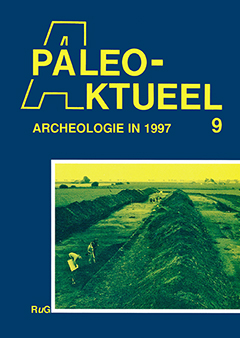OPGRAVING WINSUM-BRUGGEBUREN: ROMEINEN IN FRIESLAND!
Samenvatting
Last year a large-scale excavation was carried out in the levelled terp Bruggeburen, near Winsum (municipality of Littenseradiel), in the province of Friesland. The terp was one of the highest and largest of the northern Netherlands before it was quarried for the fertile terp soil during the second half of the 19th century. During these commercial diggings a number of early Roman pottery sherds were found. They were interpreted as belonging to a Roman military outpost. Building activities threatened the last part of the levelled terp, so an excavation was undertaken. The excavation revealed a lot of features and finds from the early Iron Age (7th century BC) up to the 14th century AD. The most important finds date from the early Roman period, most probably between 12 BC and AD 28, during which Friesland (or Frisia) was part af the Roman Empire. The finds from this period include fragments af amphorae, terra sigillata, Pompeian pottery and coins specially struck for soldiers. The amphorae originale in Rhodes, southern Spain and southern France. Although no military equipment was found, the range of pottery and the types af amphorae (wine, olive oil and fish sauce) are typical af military presence. Besides the Roman harbour at Velsen (province of North Holland) Winsum Bruggeburen is the only location in the Netherlands beyond the Limes where military presence can be attested

